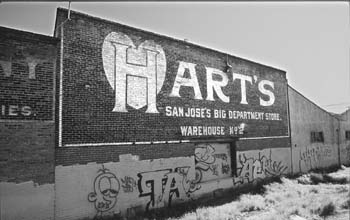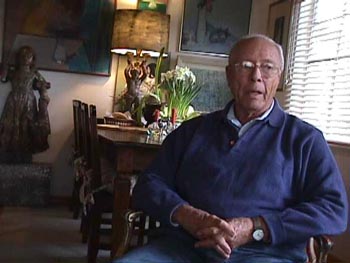The Retail Tradition
A sign by the railroad tracks is all that remains of the once mighty Hart's retailing empire.
Early Jewish immigrants staked their claims downtown
By Cecily Barnes
'Those who were more prosperous stayed in San Francisco because, to expand their businesses, they needed access to the ports," recalls San Jose Jewish historian Steve Kinsey. "The Jews that came here came for different reasons. It was a totally different environment that didn't lend itself to contribution. You wouldn't have found the kind of culture here that was in San Francisco. We just didn't have those types of things."
Instead of building museums, libraries, schools and opera houses, San Jose's earliest Jews constructed a simple and sturdy business community. Market and Santa Clara Street became lined with Jewish merchants, all of whom knew each another from business and the temple.
Hyman Rich, Bickur Cholim's first rabbi, ran a clothing shop with his friend Max Blumenthal. Up the way on Market Street, the tailor shop was owned by Hyman's brother, Jacob Rich, and his friend, Hyman Levy. Down two streets on the corner of Santa Clara and San Pedro, Lazard Lion ran his general merchandise store. Lion later acquired the San Jose Glove Factory, opened a carpet shop across from the Music Hall building on Knox Block and directed the Commercial and Savings Bank on First and Santa Clara. He, too, had a relative working up the street, his half-brother Leopold Hart, who owned a drugstore that later became Hart's Department Store. Mayer and Jacob Levy set up the Levy Brothers on First and Santa Clara streets. Jacob Atlas started Atlas Auto Wreckers, the South Bay's first automobile dismantling business. The Fox family started the recyclery, Markovits and Fox. Marcus Stern ran his saddle shop downtown. Out of all these businesses, only Stern's, Markovitz and Fox and Atlas Auto Wrecking remain.
Hart's Department Store left downtown for the Westgate shopping center in the late 1960s. "Retail went where the customers were," 77-year-old Alex Hart Jr. says. It was later bought out by a regional chain and closed in 1982. Hart remains convinced that had Macy's selected downtown over Valley Fair, downtown "would have remained a wonderful, viable, important shopping district." He debunks rumors that merchants didn't want competition and attributes the loss of Macy's to the store's failure to reach agreement with a landowner over the amount of rental payments on a lease.
Directly across from Millers Outpost in the Oakridge Mall, Stern's luggage shop looks like any other chain retail establishment except that in the cluttered back office, framed photos of Marcus, Fred, Harold and Howard trace the store's legacy back to 1854. Clayton Stern, whose picture hasn't been mounted yet, will take control of the store when his mother, Gloria, retires. He will be the fifth-generation Stern to run what is the oldest family business in Silicon Valley.
Marcus Stern moved to San Jose in 1852 and founded his business two years later. When his son Fred took over the leather shop, it was with little passion--Fred was more enamored with politics and Judaism. Besides being extremely active with Bickur Cholim, Fred Stern served on the City Council and county Board of Supervisors, says his great-granddaughter-in-law, Gloria Stern. Fred's son Harold, however, was all business. Quiet and focused, he had a distaste for both politics and religion. He would chastise his father for being too involved with politics, and when he inherited the business, a ledger of unpaid debts came with it.
"People would come into the store, and Fred would just write down their name and tell them to pay later. But he wouldn't always know who they were, so he would write things like, 'the man in the gray hat,' " says Gloria Stern, who married Harold's son, Howard. "When he died, there were all sorts of debts, and they didn't know who to collect them from."
When Gloria's husband took over the business, he could juggle both the shop and an interest in community service and politics. Gloria and Howard's son Clay, Gloria tells, is solid business--just like his Grandpa Harold.
"Sometimes we still have people come in and say, 'Oh we remember your store on First Street,' or tell us they knew Harold," Gloria says. "But it happens less and less now. Most of the time they don't leave their name. Sometimes they'll just talk to one of the girls out front, who don't know much about the history."
[ San Jose | Metroactive Central | Archives ]
Copyright © Metro Publishing Inc. Maintained by Boulevards New Media.
![]()

Christopher Gardner
Dan Pulcrano
From the March 12-18, 1998 issue of Metro.
![[Metroactive Features]](/features/gifs/feat468.gif)